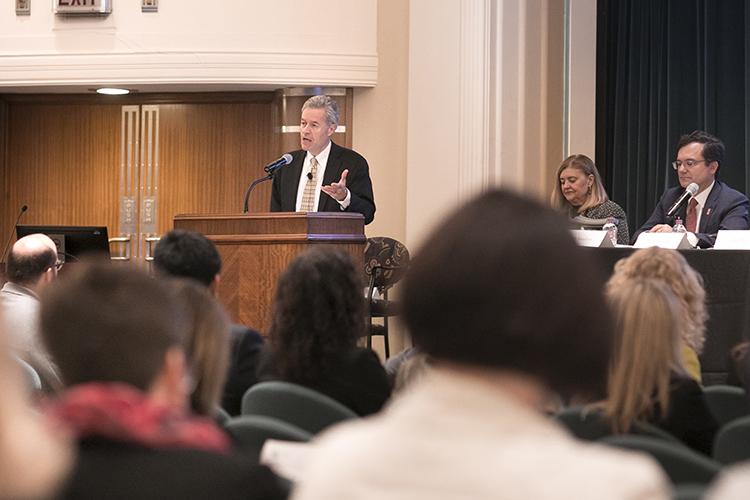Leaders from 18 colleges and universities are pledging to work together to close achievement gaps, fill jobs in fast-growing and high-demand areas and improve the quality of life in southeastern Wisconsin.
The Higher Education Regional Alliance (HERA), which includes UWM, held its public launch on Tuesday at We Energies in downtown Milwaukee. The collaboration of two- and four-year colleges and universities representing more than 150,000 students across the region formed in 2018.
“We want to close those gaps, we want to increase the skill levels, we want to better meet employers’ needs,” said UWM Chancellor Mark Mone, who chairs the alliance. HERA includes public and private higher education institutions, as well 10 economic development and community partner organizations.
“There’s no one organization that can do this alone,” Mone said. “We need to do it together.”
One of the alliance’s three goal areas focuses on increasing college completion rates.
Mone cited statistics that showed that while 75% of high school graduates in the seven-county southeastern Wisconsin area enroll in a college or university, only 48% of those who enroll graduate with a degree.
The percentage of adults age 25-64 with a workforce-relevant certificate or an associate degree or higher was 51% in Wisconsin, according to research by the Lumina Foundation cited by Mone. Among the seven counties in southeastern Wisconsin, only Ozaukee (59%) and Waukesha (58%) exceeded the state average, with the other five counties at 45% or lower.
HERA hopes to increase the statewide postsecondary attainment rate to 60% by 2027, driven by gains in southeastern Wisconsin, the most densely populated area of the state.
The other two goal areas focus on aligning, evolving and innovating academic programs both within and across institutions; and expanding bridges between employers and students while also highlighting the value of living and working in the region.
Leaders from various institutions took turns on Tuesday to talk about the goals, while business executives spoke about the potential impact of the collaboration.
The current industrial revolution covers the digitalization of production and manufacturing, said Todd McLees, the founder of the Pendio Group, a Milwaukee-based management consulting firm.
“In every case, we’ve turned to the educational community to help guide us through the learning and development that needed to occur,” McLees said. “The things that you’re hearing today … it’s about reimagination, and it’s incumbent upon all of us to maximize the productivity of the region.”
That, in part, included the increasing importance of lifelong learning, McLees said. Addressing the nursing shortage in the region is another challenge that HERA is tackling.
Julia Taylor, president of the Greater Milwaukee Committee, which is a partner in the collaboration, said that she expected to see multiple solutions emerge, including the creation of new programs, certificates and badges that would provide skills, knowledge and abilities needed by today’s workforce.
“HERA is off to a great start,” Taylor said. “It’s an exciting time to be in the Greater Milwaukee region.”






